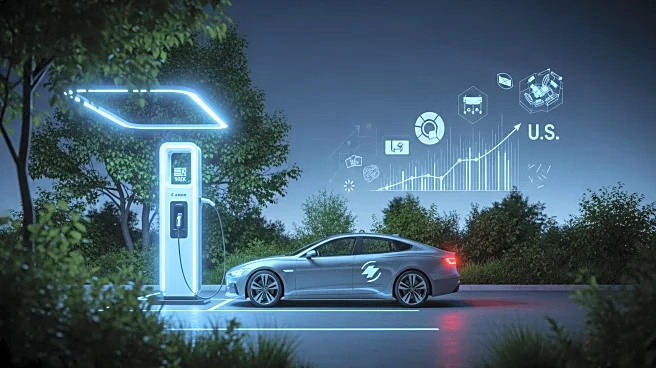What is the story about?
What's Happening?
Chinese electric vehicle manufacturer BYD has reported a significant increase in its UK sales, with a surge of 880% in September compared to the previous year. The company sold 11,271 cars in the UK last month, primarily driven by the plug-in hybrid version of its Seal U sports utility vehicle. This growth comes as the UK has become BYD's largest market outside China, benefiting from the absence of tariffs on Chinese EVs, unlike the U.S. and EU. The UK market's attractiveness is further highlighted by record high sales of electric vehicles, with pure battery electric vehicle sales reaching nearly 73,000 units.
Why It's Important?
The surge in BYD's UK sales underscores the growing demand for electric vehicles in markets that have not imposed tariffs on Chinese imports. This development highlights the competitive advantage Chinese manufacturers have in tariff-free regions, potentially influencing global EV market dynamics. In contrast, the U.S. market remains challenging for Chinese EV makers due to high tariffs, which have effectively restricted their entry. This situation may impact U.S. consumers and the domestic EV industry, as competition from affordable Chinese models is limited, potentially affecting pricing and innovation.
What's Next?
BYD plans to expand its offerings in the UK with more hybrid and electric models, aiming to capitalize on the growing demand. The company's strategy may prompt other Chinese manufacturers to explore similar markets, potentially increasing competition in the global EV sector. Meanwhile, the U.S. may need to reassess its tariff policies to foster a more competitive environment for EVs, which could involve negotiations or policy adjustments to balance protectionism with market growth.
Beyond the Headlines
The disparity in tariff policies between the U.S. and other regions like the UK raises questions about the long-term implications for the global automotive industry. The U.S. may face challenges in maintaining its competitive edge in the EV market if it continues to restrict access to affordable foreign models. This could lead to broader discussions on trade policies and their impact on innovation and consumer choice in the automotive sector.















